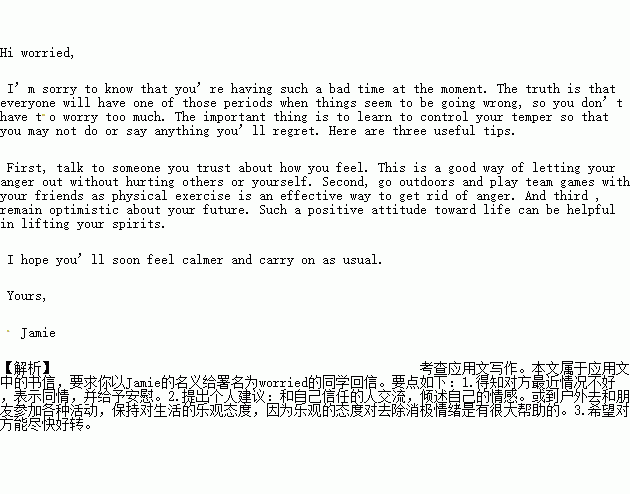��Ŀ����
�������
Ϊ�˰�����ѧ�������ɳ���ij��ѧӢ�ı������ˣ�HEART-TO-HEART��ר�����������Ǹ���Ŀ�ı༭Jamie ���յ�һ������ΪWorried�������š����и�ͬѧ������˵���Լ������ţ���������Ƣ����ʹ������ѧϰ�������ܵ���Ӱ�졣����Ӣ�ĸ���ͬѧдһ����š�
����Ҫ�����£�
��. ��ʾ���Ⲣ���谲ο ��
2. ������鲢˵�����ɡ�
ע�⣺1.����100-120���ң�
2.���в��ܳ����뱾����ص���Ϣ��
3.�ŵĿ�ͷ���β��Ϊ����ã��������ܴ�����
�ο��ʻ㣺 temper n. Ƣ��������
Hi Worried,
I��m sorry to know that you��re having such a bad time at the moment.________________________________________________________________________
________________________________________________________________________________
________________________________________________________________________________
________________________________________________________________________________
________________________________________________________________________________
________________________________________________________________________________
________________________________________________________________________________
Yours,
Jamie
 �����ƻ���ĩ��̶�100��ϵ�д�
�����ƻ���ĩ��̶�100��ϵ�д� �ܿ���ȫ��100��ϵ�д�
�ܿ���ȫ��100��ϵ�д�

 coming in. There was something
coming in. There was something  about the steaming, roaring string of cars coming into view around the mountains, slowly growing larger and and finally crowds of strangers onto the platform.
about the steaming, roaring string of cars coming into view around the mountains, slowly growing larger and and finally crowds of strangers onto the platform.  we finally fell uncomfortably asleep in the straight-backed seats.
we finally fell uncomfortably asleep in the straight-backed seats. gers onto the platform.
gers onto the platform.  in trip when I was ten years old. I went with my elder sister to visit our cousins six hundred miles away. The train--so loud and violent on the outside--was and rocking inside. We were very excited, and as that was also our first time away from our parents, we felt somewhat frightened too. However, because I had so much, I was a little disappointed when I was finally one of the passengers I had for so long.
in trip when I was ten years old. I went with my elder sister to visit our cousins six hundred miles away. The train--so loud and violent on the outside--was and rocking inside. We were very excited, and as that was also our first time away from our parents, we felt somewhat frightened too. However, because I had so much, I was a little disappointed when I was finally one of the passengers I had for so long. irplane.
irplane. money
money C. noisier D. faster
C. noisier D. faster